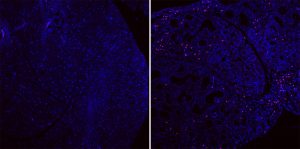Certain fungi move from the gut to the pancreas, expand their population more than a thousand-fold, and encourage pancreatic cancer growth, a new study finds.
Published online in Nature, the study is the first to offer strong evidence that the mycobiome—the local mix of fungal species in the pancreas—can trigger changes that turn normal cells into pancreatic ductal adenocarcinoma (PDA). This form of cancer is usually fatal within two years.
Conducted in mice and in people with pancreatic cancer, the study found that fungal species travel into the pancreas up the pancreatic duct, a tube through which digestive juices drain in the opposite direction into the intestines. The study authors say this exchange results in abnormal fungal populations in both the gut and pancreas, in the presence of PDA.
Led by researchers from NYU School of Medicine and NYU College of Dentistry, the study also found that treating mice with a potent antifungal drug reduced their PDA tumor weight by 20 to 40 percent over 30 weeks.
“While past studies from our group have shown that bacteria travel from the gut to the pancreas, our new study is the first to confirm that fungi too make that trip, and that related fungal population changes promote tumor inception and growth,” said senior study co-author George Miller, MD, co-leader of the Tumor Immunology Research Program at Perlmutter Cancer Center, the H. Leon Pachter, MD, Professor of Surgery in the Department of Surgery, and professor in the Department of Cell Biology at NYU Langone Health.
While viruses, bacteria, and parasites are recognized by the American Cancer Society as causal factors in the disease, say the study authors, no previous study had linked fungi to pancreatic cancer.
Study details
To determine whether the mycobiome is reprogrammed as normal cells become cancerous (oncogenesis), the team performed analyses over 30 weeks of fecal samples from mice with and without pancreatic cancer. Researchers used genomic and statistical techniques to identify and count the fungal species present. They also attached glowing proteins to fungi to track their migrations through the gut and pancreas.
By the end of the study period, the researchers observed significant differences in the size and composition of the fungal population in the cancerous pancreas when compared to the healthy organ. The largest population increase in both mice and in human tissues was seen in the genus Malassezia, which includes 14 species. The team also detected abnormally higher numbers in the genera Parastagonospora, Saccharomyces, and Septoriella.
“We have long known that Malassezia fungi—generally found on the skin and scalp—are responsible for dandruff and some forms of eczema, but recent studies have also linked them to skin and colorectal cancer,” said senior co-author Deepak Saxena, PhD, associate professor in the Department of Surgery and professor of basic science and craniofacial biology at NYU College of Dentistry. “Our new findings add evidence that Malassezia is abundant in pancreatic tumors as well.”
To test the effect of changing fungal populations on cancer growth, the team treated the mice with amphotericin B, a strong, wide-spectrum antifungal drug. Along with reducing tumor weight, antifungal treatment also reduced the occurrence of ductal dysplasia, an early cellular step toward pancreatic cancer, by 20 to 30 percent.
“Fungal ablation also strengthened the anti-cancer effect of a standard chemotherapy, gemcitabine, by 15 to 25 percent,” said co-first author Berk Aykut, MD, a postdoctoral fellow in Miller’s lab.
After the pancreases of the mice had been mostly cleared of fungi by drug treatment, the team then examined the effect on cancer growth if only certain species were allowed to repopulate the organ. They found that cancer grew 20 percent faster in the pancreases of mice repopulated with Malassezia—but not in the presence of other oft-occurring fungal species.
The study results argue that fungi increase cancer risk by activating an ancient, first-responder part of the immune system, the complement cascade. Such mechanisms fight infections, but also trigger the healing process (cell growth) as infections wane. Along these lines, complement has been shown by past studies to encourage aggressive tissue growth (cancer) when combined with genetic flaws.
“Moving forward, one goal for our team is to determine which species are most relevant to cancer, as doing so could guide future attempts to slow tumor growth with targeted antifungal medications, and to avert side effects,” said co-first author Smruti Pushalkar, PhD, a research scientist at NYU College of Dentistry.
Source: NYU LANGONE HEALTH
Browse by Category
Tags
AAMI
AORN
Award
Bacteria
BIOCHEMISTRY
biology
cancer
CBSPD
Chemotherapy
colon cancer
colorectal cancer
colorectal cancer screening
COVID-19
Diagnostics
Duodenoscope
Education
EndoChoice
EndoPro Magazine
Endoscope
Endoscopy
FDA
gastroenterology
gastrointestinal disorders
Genetics
Healthmark
Hospitals
IAHCSMM
IBD
IBS
Infections
irritable bowel syndrome
MEDICINE/HEALTH
News
Olympus
Pentax
PHARMACEUTICAL CHEMISTRY
PHARMACEUTICAL SCIENCE
polyps
PPE
Public Health
recall
Screening
SGNA
Studies
Super Bugs
© 2023 Copyright. All Rights Reserved. Design & Developed by Insightful Technologies.














